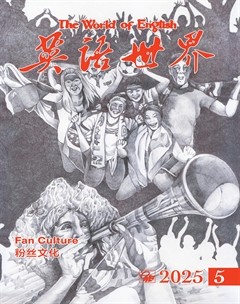If you’re someone who is deeply devoted fan (of anything, really), fandom may make up a significant part of your mental, emotional, and social life. If you’ve ever emerged from a six-hour long fanfic1 binge2 and found yourself wondering “Hey, where did the word ‘fandom’ come from, anyway?” (and also “When did it turn into tomorrow?!”), you’re in luck. (Well, partially. I can tell you about the origins of the word “fandom,” but I can’t reverse your decision to start a 250 thousand-word fic at one AM. Sorry ’bout that.)
如果你是一个全情投入的粉丝(实际上无论你喜欢什么),那么“粉圈”可能构成了你精神、情感和社交生活的重要组成部分。如果你曾纵情阅读粉丝小说长达六小时,回过神发现自己不禁疑惑:“咦,fandom这个词到底是从哪儿冒出来的?”(还有,“怎么就到‘明天’了?!”)那么你真是走运了。(不过,只是部分走运。我可以告诉你fandom一词的起源,但我无法让你取消凌晨1点开始读25万字粉丝小说的决定。我对此深感抱歉。)
In many ways, fandom can seem like a very modern, internet-based phenomenon, but Millennials were far from the first people to get really, really excited about their favorite things. Long before the internet was invented, fan groups were publishing fan magazines, attending cons, writing fanfic, and making fanvids3. The word “fandom,” too, has been around for a long time—well over a century, in fact.
从很多方面来看,粉圈像是一个十分现代的、基于互联网的现象,但千禧一代绝非第一批对自己喜爱的事物非常、非常狂热的人。早在互联网发明之前,粉丝群体就已经在出版粉丝杂志、参加展会、创作粉丝小说、制作粉丝视频了。fandom这个词也早已有之,实际上已经存在了一个多世纪。
The history of the word “fandom” starts with a very old word—“fanatic.” “Fanatic” arose out of a Latin word, “fānāticus,” which, in turn, came from the word “fanum,” meaning “temple” or “shrine.”
fandom的历史要从一个非常古老的词——fanatic说起。fanatic源自拉丁语单词fānāticus,而后者又源自fanum,义为“神庙”或“圣地”。
The Oxford English Dictionary (OED) states that “fanatic” made its way into English in 1533, as an adjective meaning “frenzied” or “mad.” It first appeared in print as a noun, meaning “a visionary; an unreasoning enthusiast,” in 1644. In the second half of the 17th century, the English used “fanatic” as an insult, referring to Nonconformists (aka Protestants who wouldn’t adhere to the Church of England).
《牛津英语词典》指出,fanatic于1533年作为形容词收入英语词汇,义为“狂热的”或“疯狂的”。该词首次作为名词出现在印刷品上是在1644年,义为“空想家;不理智的爱好者”。17世纪下半叶,英国人将fanatic用于侮辱非国教信徒(即不信仰英国国教的新教徒)。
It didn’t take too long for people to shorten “fanatic” to “fan”; variations of “fan” appeared in print as early as 1682. It wasn’t until the late-19th century, however, that “fan” began to be used in relation to sports enthusiasts (especially baseball devotees), separating the term from its original religious connotation4. That said, anyone who has participated in their fandom having a collective meltdown5 at the promise of new episodes, or when actors seem to acknowledge fans’ OTP6 will recognize themselves in the early association of “fanatic” with overwhelming religious fervor. And I say that with love—if my favorite fandoms are melting down, I’m usually right there in the pot with everyone else.
没过多久,人们便将fanatic缩写为fan。早在1682年,fan的各种变体就已出现在印刷品上。然而,直到19世纪晚期,fan才开始与体育爱好者(尤其是棒球迷)联系起来,从而脱离最初的宗教含义。话虽如此,无论是因为电视剧的下集预告,还是因为演员似乎承认了粉丝口中的“完美配对”,任何经历过粉圈集体情绪失控的人都能从早期fanatic与极度宗教狂热的关联中看到自己。我说这话是带着爱意的——如果我最喜欢的粉丝群体陷入狂欢,我通常也会和大家一起沉浸其中。
“Fandom” finally made an appearance in 1903, when the Cincinnati Enquirer printed, “Fandom puzzled over Johnsonian7 statements.” The OED reports that Publishers Weekly mentioned “baseball fandom” in 1928. “Fandom” is a combination of the “fan” with the suffix “-dom.” Etymologist Michael Quinion suggests that “-dom” has two meanings when applied to words; in one usage, the suffix “denote[s] a rank or an area controlled by a person of that rank” (so a “kingdom” is the area controlled by a king, an “earldom” is the area controlled by an earl, etc). In its second usage, “-dom” refers to “a state or condition” (“wisdom,” for example, is the state of being wise).
fandom一词最终在1903年出现,当时《辛辛那提问询报》刊登了《粉圈对约翰逊派言论感到困惑》一文。据《牛津英语词典》描述,《出版人周刊》在1928年提到了baseball fandom(棒球粉圈)。fandom是fan与后缀“-dom”的组合。语源学家迈克尔·基尼恩认为,后缀“-dom”应用于单词时有两种含义:其一“表示某个等级或该等级人物控制的区域”(例如:kingdom指国王控制的区域,earldom指伯爵控制的区域,等等);其二表示“状态或状况”(例如:wisdom表示拥有智慧的状态)。
Although “fandom” is generally used to refer simply to a collection of fans, I like the idea of taking both of these meanings of “-dom” literally. If we read “fandom” the same way as “kingdom,” then it would literally refer to a region controlled by fans—a meaning that I think expresses something essential about fandom: It is a group dedicated to showing devotion to some object (a show, a comic, a sports team, what-have-you), but it is also a site of production generated and controlled by fans—a space where fans create their own language and communities, and where they reimagine characters and worlds into something that is uniquely theirs. And if we define “-dom” in this case as a state of being, similarly to words like “wisdom” or “freedom,” then “fandom,” too, is a state of being, a condition that fans have. That defin-ition—the idea that fandom isn’t simply an external community, but also a mode of being—will ring true to anyone who’s ever been deeply enmeshed in a fandom. You know who you are.
虽然fandom通常只用来指代粉丝群体,但我倾向于结合“-dom”的两种字面含义来理解fandom。如果我们像理解kingdom那样理解fandom,那么fandom的字面意思就是“由粉丝控制的区域”——我认为这体现了粉圈的本质特征:既是致力于对某个对象(节目、漫画、运动队等,不一而足)表达忠诚的群体,也是由粉丝打造和控制的创作场所——粉丝们在此创造自己的语言和社群,也在此重新构想角色和世界,使之成为独属于自己的存在。如果我们把fandom的“-dom”定义为一种存在状态,类似wisdom或freedom等词的后缀,那么fandom也是一种存在状态,就是粉丝们所处的状态。粉圈不仅仅指外在的社群,还是一种存在方式——这个定义对于任何曾经深陷粉圈的人来说都会感同身受。你清楚自己属于哪个圈子。
(译者单位:中央民族大学)
1 = fan fiction粉丝小说,指的是粉丝利用原有漫画、动画、小说、影视等作品中的人物角色、故事情节或背景设定等元素二次创作出来的小说。 2 binge狂欢;放纵。
3 = fan video粉丝视频,指粉丝二次创作出来的视频。 4 connotation隐含意义。
5 meltdown情绪突然失控。 6 = one true pairing完美配对。 7 Johnsonian塞缪尔·约翰逊研究学者(或崇拜者)。






